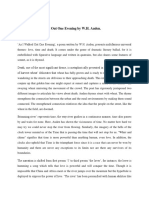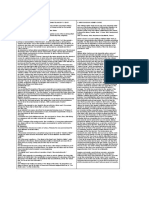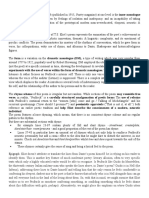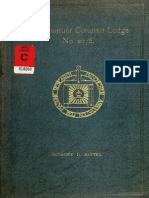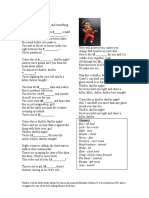0 ratings0% found this document useful (0 votes)
21 viewsImportant Failure".: 1. W.H. Auden Musée Des Beaux Arts (Museum of Fine Arts)
Important Failure".: 1. W.H. Auden Musée Des Beaux Arts (Museum of Fine Arts)
Uploaded by
Karina HałasThe document discusses several poems:
1. W.H. Auden's "Musée des Beaux Arts" summarizes a Pieter Bruegel painting about suffering going unnoticed while the world continues on.
2. W.H. Auden's "In Memory of W.B. Yeats" discusses the death of Yeats and makes Auden's famous statement that "poetry makes nothing happen."
3. D.H. Lawrence's "Snake" describes a man's initial fear of a snake at a water trough that turns to remorse after it escapes.
4. Two poems by Elizabeth Jennings are discussed - "Narcissus" is an
Copyright:
© All Rights Reserved
Available Formats
Download as DOCX, PDF, TXT or read online from Scribd
Important Failure".: 1. W.H. Auden Musée Des Beaux Arts (Museum of Fine Arts)
Important Failure".: 1. W.H. Auden Musée Des Beaux Arts (Museum of Fine Arts)
Uploaded by
Karina Hałas0 ratings0% found this document useful (0 votes)
21 views2 pagesThe document discusses several poems:
1. W.H. Auden's "Musée des Beaux Arts" summarizes a Pieter Bruegel painting about suffering going unnoticed while the world continues on.
2. W.H. Auden's "In Memory of W.B. Yeats" discusses the death of Yeats and makes Auden's famous statement that "poetry makes nothing happen."
3. D.H. Lawrence's "Snake" describes a man's initial fear of a snake at a water trough that turns to remorse after it escapes.
4. Two poems by Elizabeth Jennings are discussed - "Narcissus" is an
Original Description:
d
Original Title
1
Copyright
© © All Rights Reserved
Available Formats
DOCX, PDF, TXT or read online from Scribd
Share this document
Did you find this document useful?
Is this content inappropriate?
The document discusses several poems:
1. W.H. Auden's "Musée des Beaux Arts" summarizes a Pieter Bruegel painting about suffering going unnoticed while the world continues on.
2. W.H. Auden's "In Memory of W.B. Yeats" discusses the death of Yeats and makes Auden's famous statement that "poetry makes nothing happen."
3. D.H. Lawrence's "Snake" describes a man's initial fear of a snake at a water trough that turns to remorse after it escapes.
4. Two poems by Elizabeth Jennings are discussed - "Narcissus" is an
Copyright:
© All Rights Reserved
Available Formats
Download as DOCX, PDF, TXT or read online from Scribd
Download as docx, pdf, or txt
0 ratings0% found this document useful (0 votes)
21 views2 pagesImportant Failure".: 1. W.H. Auden Musée Des Beaux Arts (Museum of Fine Arts)
Important Failure".: 1. W.H. Auden Musée Des Beaux Arts (Museum of Fine Arts)
Uploaded by
Karina HałasThe document discusses several poems:
1. W.H. Auden's "Musée des Beaux Arts" summarizes a Pieter Bruegel painting about suffering going unnoticed while the world continues on.
2. W.H. Auden's "In Memory of W.B. Yeats" discusses the death of Yeats and makes Auden's famous statement that "poetry makes nothing happen."
3. D.H. Lawrence's "Snake" describes a man's initial fear of a snake at a water trough that turns to remorse after it escapes.
4. Two poems by Elizabeth Jennings are discussed - "Narcissus" is an
Copyright:
© All Rights Reserved
Available Formats
Download as DOCX, PDF, TXT or read online from Scribd
Download as docx, pdf, or txt
You are on page 1of 2
1. W.H.
Auden Musée des Beaux Arts (museum of fine arts)
ekphrastic poem→ description of the painting in the body of the poem:
The poet uses Pieter Bruegel's painting "Landscape with the Fall of Icarus" as a pretext to
broach the matter of suffering happening simultaneously with all the other actions left
unaffected, as that is exactly what the paining captures - how one's death has objectively no
impact on the world's order; everyone’s concerned with their own, internal matters, like the
ploughman who “may have heard the splash, the forsaken cry, but for him it was not an
important failure”.
The poem is about the general indifference towards the suffering in the world, how tragedy of
the individual often lays unnoticed and sidelined as the world just goes on at its own pace
with no regard for personal tragedies. For some, ordinary events, like "opening a window" or
"walking dully along" are a part of life at the same time when another one meets with
something as horrible as death.
subject: poem is about a painting; the fall of icarus; it is about the suffering; icarus as a
pretext to say something about suffering; painting is an inspiration; in this poem we move
from something that is particular (which is like a stimulus, a push), we move towards some
general conclusions, observations, remarks;
suffering → comes unnoticed by other people; it has no impact on the natural order; other
people are unaffected; indifference of other people; it is natural; the world just goes on at its
own pace; tragedies in real life are quite often sidelined; its individual; they understood the
simultaneity of suffering
The Old Masters: how well they understood → reference to the great painters of the past
Its human position: how it takes place
2. In Memory of W. B. Yeats - W. H. Auden
For poetry makes nothing happen - This is often analysed as an admission of poetry’s
limitations as a tool for social and political change; BUT (!) although it doesn’t make anything
happen, it is itself a ‘way of happening’ - not something that makes history happen but part of
history itself, perhaps, and part of life.
PART I: In the first section, W. H. Auden discusses the death of W. B. Yeats ‘in the dead of
winter’
PART II: Auden begins to turn away from Yeats in particular to think about poetry more
generally. It is here that Auden makes his famous statement that ‘poetry makes nothing
happen’
PART III: The poem concludes with an impressive summing up of Yeats’s achievement. It is
the funeral and the speaker asks the Earth to receive Yeats as “an honoured guest.” The
body, “emptied of its poetry,” lies there. The poem ends in an optimistic note that Yeat’s life
has not been lived in vain and that poetry is all powerful in the world of spirit.
3. D.H. Lawrence Snake
Firstly, we see a man meeting a snake at a water-trough, accepting that the snake ' was at the
trough before me', so he the man, must wait. I happens in Sicily
Then, the narrator poses the question of whether or not the snake should be killed—perhaps
the religious upbringing, the speaking voice has only negative associations with the snake,
maybe having in mind the Bible where Eve is tempted by a serpent to eat the apple.
when the snake moved away towards the hole, the poet got hold of a piece of wood and
hastily threw it towards the snake. The snake was not hit but he vanished in the hoe at a
lighning speed.
In the end, the poet is full of remorse for his uncivilized behavior towards the snake and
wishes the snake to come back to enable him to say sorry for his pettiness. He thinks that the
snake is the uncrowned king of the underworld. Due to his folly and narrow-mindedness,
he had lost the chance of his respectable company.
4. Elizabeth Jennings – Narcissus (1972)
Ekphrasis (Caraviaggio’s painting)
Not to look at oneself but at others as well
5. Elizabeth Jennings – Landscapes and Figures
Claude Monet’s mentioned
Painting which depict landscapes should teach us selflessness; that people sometimes do not
fit into the picture and nature is more glorious than them – “a background teaches a
moral you’d hardly expect”. The moral is to step back and appreciate the landscape, its
power and beauty, not only to focus on ourselves.
5. Thomas Hardy - "On the departure platform"
It tells the story of a man who says goodbye to his lover on the train platform. The couple part
at the barrier, the woman moves away, and the poet watches her receding from sight until she
is just a moving spot.
Words like "fitful" "apart" "disappear" "ceased" "nebulous" and "vanished" create powerful
feeling of loss, distance and uncertainty
Internal monologue at the end with him old and present self
You might also like
- The Arts of Indigenous Health and Well-Being - Nancy Van StyvendaleDocument281 pagesThe Arts of Indigenous Health and Well-Being - Nancy Van StyvendaleSpace RocketNo ratings yet
- Individualism EssayDocument3 pagesIndividualism Essayrobktf0% (1)
- Textual Analysis - Two Cars One NightDocument12 pagesTextual Analysis - Two Cars One NightMarcus RhodesNo ratings yet
- Cinderella Play ScriptDocument5 pagesCinderella Play ScriptRoxana Quispe Cuadros100% (2)
- Lewis Nkosi - Mating Birds PDFDocument71 pagesLewis Nkosi - Mating Birds PDFJesi Lopez50% (4)
- JOY or NIGHT - Seamus HeaneyDocument3 pagesJOY or NIGHT - Seamus HeaneyGlitterladyNo ratings yet
- Poetry of MourningDocument94 pagesPoetry of MourningAlessandra Francesca100% (1)
- The Second ComingDocument9 pagesThe Second ComingAiram NuquiNo ratings yet
- Keats Ode To A NightingaleDocument21 pagesKeats Ode To A NightingaleSàñLy KhanNo ratings yet
- My Man GodfreyDocument7 pagesMy Man GodfreyPascualRocamoraNo ratings yet
- The Love Letters of A Portugese Nun (Lit)Document25 pagesThe Love Letters of A Portugese Nun (Lit)Khaula Abbasi100% (1)
- Black Ships Before Troy: The Story of The Iliad: Extension Project Bloom Ball: A Creative Book ReportDocument3 pagesBlack Ships Before Troy: The Story of The Iliad: Extension Project Bloom Ball: A Creative Book ReportTai D. MatthewsNo ratings yet
- Short Story Planning SheetDocument4 pagesShort Story Planning SheetAdam100% (1)
- Musée Des Beaux ArtsDocument3 pagesMusée Des Beaux ArtsLauren Gail DivinoNo ratings yet
- About The PoemDocument9 pagesAbout The PoemIbyang TupasNo ratings yet
- In Memory of W B YeatsDocument5 pagesIn Memory of W B Yeatslrannapoorna_9533852No ratings yet
- Lady LazarusDocument5 pagesLady LazarusKusum KafleNo ratings yet
- In Memory of W B YeatsDocument7 pagesIn Memory of W B Yeatssavithri MNo ratings yet
- Essay - Auden - in Memory of W.B YeatsDocument2 pagesEssay - Auden - in Memory of W.B YeatsPranvera KameriNo ratings yet
- Is Poetry A Denial or Sublimation of ReaDocument4 pagesIs Poetry A Denial or Sublimation of ReabigbananaNo ratings yet
- W.h.auden 1Document5 pagesW.h.auden 1rabiaNo ratings yet
- The Hollow MenDocument6 pagesThe Hollow MenIkram Tadj100% (1)
- W H AudenDocument6 pagesW H AudenJimmi KhanNo ratings yet
- The Key Features of RomanticismDocument9 pagesThe Key Features of RomanticismKhalid JaffalNo ratings yet
- Critical Analysis of W.H Auden Poems The PDFDocument8 pagesCritical Analysis of W.H Auden Poems The PDFMöĤämmĔd äĹ-ŚäÁdï100% (1)
- IJLL - Development of Thought in John Keats' Series of Odes - 1Document4 pagesIJLL - Development of Thought in John Keats' Series of Odes - 1iaset123No ratings yet
- Poetic RevolutionDocument11 pagesPoetic RevolutionNada BNo ratings yet
- Musee Des Beaux ArtsDocument7 pagesMusee Des Beaux Artsddbddb149No ratings yet
- Summary of WastelanddDocument12 pagesSummary of Wastelanddfiza imranNo ratings yet
- Death in Venice Lecture NoteDocument3 pagesDeath in Venice Lecture NoteRyan LeighNo ratings yet
- 3 18k5e12 2020101607174635Document32 pages3 18k5e12 2020101607174635Rebecca smithNo ratings yet
- Emily Dickinson PoetryDocument11 pagesEmily Dickinson Poetryapi-254098177No ratings yet
- Schreiber - But Enough About MeDocument12 pagesSchreiber - But Enough About MeAnonymous 5b99IEfnSlNo ratings yet
- Auden Musee Des Beaux ArtsDocument1 pageAuden Musee Des Beaux Artscarlomi1No ratings yet
- Enotes Tonight Can Classification Modernist TextDocument3 pagesEnotes Tonight Can Classification Modernist TextZeventricNo ratings yet
- John Keats Summary & Analysis203 - 220818 - 105324Document84 pagesJohn Keats Summary & Analysis203 - 220818 - 105324Adman AlifAdmanNo ratings yet
- Auden WHDocument20 pagesAuden WHRangothri Sreenivasa Subramanyam0% (1)
- 303Document5 pages303SS STATUSNo ratings yet
- Window: About The Poem: Meaning: The Basic Premise of The Poem Is Response ToDocument3 pagesWindow: About The Poem: Meaning: The Basic Premise of The Poem Is Response ToJerome TobiasNo ratings yet
- English Poetry ProjectDocument10 pagesEnglish Poetry ProjectShreya JayarajNo ratings yet
- Vise and Shadow: Essays on the Lyric Imagination, Poetry, Art, and CultureFrom EverandVise and Shadow: Essays on the Lyric Imagination, Poetry, Art, and CultureNo ratings yet
- Cc10 p1 PDFDocument1 pageCc10 p1 PDFR.N SINGHNo ratings yet
- Robert Frost Toni PDFDocument13 pagesRobert Frost Toni PDFWillem ViljoenNo ratings yet
- Literature PoemDocument10 pagesLiterature PoemFiros Khan100% (3)
- "To Be Acutely Conscious Is A Disease, A Real, Honest-To-Goodness Disease." Dostoevsky, Notes From TheDocument5 pages"To Be Acutely Conscious Is A Disease, A Real, Honest-To-Goodness Disease." Dostoevsky, Notes From TheShamsNo ratings yet
- Keith ApuntesDocument26 pagesKeith Apuntespakitoo3No ratings yet
- Poetic DevicesDocument35 pagesPoetic DevicestinarizpoetryNo ratings yet
- The Waste Land by T.S. Eliot As A Modern EpicDocument3 pagesThe Waste Land by T.S. Eliot As A Modern EpicIJELS Research JournalNo ratings yet
- Slogging To Byzantium - The SpectatorDocument6 pagesSlogging To Byzantium - The SpectatordaniellNo ratings yet
- The Second ComingDocument10 pagesThe Second ComingChanaka Palliyaguru100% (3)
- Yeats and Wordsworth As Romantic PoetsDocument13 pagesYeats and Wordsworth As Romantic PoetsKhan XadaNo ratings yet
- Byzantium AnalysisDocument2 pagesByzantium AnalysisRida MalikNo ratings yet
- Mode of DeathDocument4 pagesMode of DeathMaría Mazzanti100% (1)
- Images in T.S. Eliot's The Waste Land: V. Beulah RaniDocument5 pagesImages in T.S. Eliot's The Waste Land: V. Beulah RaniRizwana ZakirNo ratings yet
- Art V S Reality in The Odes of Keats Wit PDFDocument12 pagesArt V S Reality in The Odes of Keats Wit PDFBabarNo ratings yet
- Characteristic Features of Modernist FictionDocument4 pagesCharacteristic Features of Modernist FictionAntonia AntoNo ratings yet
- The ChairsDocument8 pagesThe ChairsDevika MenonNo ratings yet
- Through A Glass, Darkly: Analysis of Three Poems by W. H. AudenDocument7 pagesThrough A Glass, Darkly: Analysis of Three Poems by W. H. AudenAbigail_Robles_6169No ratings yet
- Assignment Yeats As A Modern Poet - MujahidDocument4 pagesAssignment Yeats As A Modern Poet - MujahidDDC RYKNo ratings yet
- In The Memory of W. B. YeatsDocument12 pagesIn The Memory of W. B. Yeatssrqrox100% (1)
- Footprints by Denise LervertovDocument6 pagesFootprints by Denise LervertovNat RogersNo ratings yet
- 1 The Love Song of J. Alfred Prufrock (Published in 1915, Poetry Magazine) at One Level Is The Inner MonologueDocument4 pages1 The Love Song of J. Alfred Prufrock (Published in 1915, Poetry Magazine) at One Level Is The Inner MonologueDhirendra Kumar Shah50% (2)
- Why Poetry Matters by PariniDocument10 pagesWhy Poetry Matters by PariniMeshoyemNo ratings yet
- Drama 1Document11 pagesDrama 1Bushra MumtazNo ratings yet
- Doctrine of TemptationDocument7 pagesDoctrine of Temptationthelightheartedcalvinist6903No ratings yet
- An Ocean Without ShoreDocument199 pagesAn Ocean Without ShoreBogdan Scupra75% (4)
- Kumari Kandam-The Lost WorldDocument11 pagesKumari Kandam-The Lost WorldAnupam0103100% (2)
- ME RhythmDocument20 pagesME RhythmRenmar Jun Martinez100% (6)
- OGR Invisible CitiesDocument11 pagesOGR Invisible Citiesemorley3No ratings yet
- Acupuncture Stems and Branches Year Chart PDFDocument1 pageAcupuncture Stems and Branches Year Chart PDFRanga NathanNo ratings yet
- The Locutor's Linguistic Creativity: Morphology, Taina Du Escu-ColibanDocument68 pagesThe Locutor's Linguistic Creativity: Morphology, Taina Du Escu-ColibanandreidmannnNo ratings yet
- V Mwai Al HGLDocument294 pagesV Mwai Al HGLPatrick Flynn100% (2)
- Research Paper Topics Romeo and JulietDocument4 pagesResearch Paper Topics Romeo and Juliettitamyg1p1j2100% (1)
- BI Year 5 Unit 4 (LP71-88)Document22 pagesBI Year 5 Unit 4 (LP71-88)MAJJI ATHI LAKSHMY A/P SURYANARAYANAN KPM-GuruNo ratings yet
- Standard LanguageDocument3 pagesStandard LanguageHusna YaacobNo ratings yet
- Fictionalizing The Past: Historical Characters in Arabic Popular EpicDocument3 pagesFictionalizing The Past: Historical Characters in Arabic Popular Epicarafat9194No ratings yet
- Measure For Measure Quizzes - Measure For Measure Study GuideDocument6 pagesMeasure For Measure Quizzes - Measure For Measure Study GuideNazmul Hasan100% (1)
- HamletDocument11 pagesHamletBianca IonitaNo ratings yet
- Spanish PoemsDocument22 pagesSpanish PoemskaiserjhinkzNo ratings yet
- The 4 Coronati Lodge (BAXTER, Roderick)Document86 pagesThe 4 Coronati Lodge (BAXTER, Roderick)Claudio FerrazNo ratings yet
- 11 TH Grade SentencesDocument19 pages11 TH Grade SentencesChandler BessNo ratings yet
- Brokeback Mountain ThesisDocument8 pagesBrokeback Mountain Thesismvlnfvfig100% (2)
- Halloween Song Thriller Michael Jackson Activities With Music Songs Nursery Rhymes CLT Com 60085Document3 pagesHalloween Song Thriller Michael Jackson Activities With Music Songs Nursery Rhymes CLT Com 60085Света СливаNo ratings yet
- Question Bank & Answers - PoetryDocument4 pagesQuestion Bank & Answers - PoetryPrabhjyot KaurNo ratings yet
- Werner & Sonne (1947) - The Philosophy and Theory of Music in Judaeo-Arabic LiteratureDocument70 pagesWerner & Sonne (1947) - The Philosophy and Theory of Music in Judaeo-Arabic LiteratureSusan Vaughan100% (1)
- Literature Review of I-VtecDocument8 pagesLiterature Review of I-Vtecafmzveozwsprug100% (1)
























